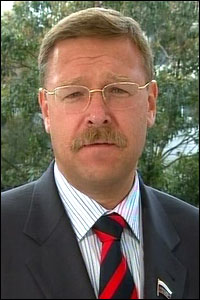
RUSSIA NEUTERING THE COUNCIL OF EUROPE AFTER INVASION OF GEORGIA
Publication: Eurasia Daily Monitor Volume: 5 Issue: 184
By:

The Council of Europe’s Parliamentary Assembly (PACE), which opens its autumn session in Strasbourg on September 29, can hardly afford to ignore Russia’s invasion of Georgia and its consequences. A motion is pending at PACE to “reconsider the Russian delegation’s credentials, on grounds of serious violations of the basic principles of the Council of Europe” (PACE doc. 11703, September 12).
Those violations are understood to include military aggression against Georgia, a unique case in which a Council of Europe member state has openly invaded, dismembered, and occupied the territory of another CE member state. Such a resort to force openly breaches Russia’s 1996 accession commitment to the CE to settle disputes by peaceful means. Compounding the breach of CE commitments, Russian military and paramilitary forces have ethnically cleansed the Georgian population from South Ossetia (at least one third of that territory’s population) and from the Russian-declared “security zone” beyond South Ossetia, in Georgia’s interior.
PACE had for many years tolerated the use of force against Georgia and other CE member states. Russia’s military occupation in varying degrees of Abkhazia, South Ossetia, and Transnistria, as well as the Armenian seizure of Azerbaijani territories, with mass-scale ethnic cleansing of Georgians and Azeris, were practically ignored by PACE since the 1990s. Russia’s breach of commitments to the Council of Europe found its counterpart in the CE’s abdication of its own mandate and mission in those cases.
The motion now pending does, however, offer PACE a chance to regain some degree of credibility. If adopted, the motion could lead to suspension of the Russian delegation’s right to vote and other rights of representation. It could also result in a recommendation to the Council of Europe’s Committee of Ministers to suspend Russia’s membership in the CE.
Twenty-four members of PACE from 14 member countries are co-sponsors of the motion. They include 13 Liberals (the motion originated in the Alliance of Liberals and Democrats for Europe—ALDE group), seven Christian-Democrats, and four others. Fifteen of the co-sponsors are from Central and East European countries.
For its part, Russia counts on the passivity or tacit support of PACE members from large West European delegations that favor business-as-usual with Moscow. Considering PACE’s voting arithmetic, the motion may indeed crash against an immovable majority of delegates.
Realizing, however, that it can not take that attitude for granted after invading Georgia, the Russians are using intimidation tactics on PACE and indirectly on Western Europe. The leaders of Russia’s delegation to PACE, Konstantin Kosachev and Mikhail Margelov, are threatening that Russia will withdraw from PACE and the Council of Europe altogether if that motion is adopted. The threat also implies that Russia would discontinue its annual contribution of 23 million Euros ($34 million) to the organization’s budget. Kosachev and Margelov have denounced the pending motion in their “Sovietspeak” as a “provocation against the Russian people,” a hint that the Russian government itself would take retaliatory steps (Interfax, September 15, 16; RIAN, September 18).
Semi-official spokesmen for Russian policy sound dire in their warnings. Writing in the Russian government’s newspaper, the Berlin-based Alexander Rahr warns that adoption of the motion at PACE would jeopardize Russia’s anti-terrorism cooperation with Europe, undermine the Russia-Europe “energy alliance” [a code term for European dependence on Russian energy deliveries], and entail “heavy costs to the European business community.” Rahr, however, expresses confidence that France and Germany would not allow such a turn of events to develop (Rossiiskaya Gazeta, September 16).
In a similar vein, Boris Makarenko of the Center for Political Technologies warns of a “deterioration of oil and gas cooperation” and “jeopardy to the corridor for supplying NATO forces in Afghanistan” via Russian territory, if PACE adopts that motion (Kommersant, September 20). Overkill warnings of this type target not so much the PACE delegates as the political leaderships and governments in West European countries.
An ad-hoc committee of nine PACE members visited Russia and Georgia from September 22 to 25 on a fact-finding exercise. While in Moscow the group’s rapporteur, Luc van den Brande of Belgium, hastened to predict the outcome of PACE’s debate on the pending motion: “I am convinced that a great majority of PACE members would not accept [it]” (Itar-Tass, September 24). Even if the prejudging is improper under the circumstances, the prediction is almost certainly on the mark.
Moscow, however, would prefer that Tbilisi be the first to blink. Russian delegates and a few allies are hinting to retaliate by challenging the Georgian delegation’s credentials, if the motion that challenges the Russian credentials is put to a vote in the assembly. The Russians would not move directly in that case, but would prefer to use proxies, only 10 of whom would be sufficient for a challenge motion against the Georgian delegation’s credentials.
This tactic could result in a tit-for-tat battle over procedural details, distracting attention from the profound implications of Russia’s invasion and ultimately placing the aggressor state and the target state on a seemingly equivalent footing. Faced with this prospect, the Georgian side and the motion’s sponsors may have to reconsider or even desist. In that case, Moscow would have demonstrated its continuing ability to influence PACE’s inner workings directly or indirectly.




